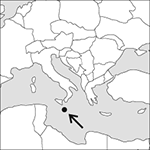
Source: MAPS IN MINUTES™ © RH Publications (1997)
Capital:
Valletta
Area:
316 sq km (122 sq miles)
Population:
411,277 (2013 est)
Currency:
1 euro=100 cents
Religions:
Roman Catholic 98.0%
Ethnic Groups:
Maltese (of Italian, British, and Phoenician origin)
Languages:
Maltese, English (both official)
International Organizations:
UN; Commonwealth; Council of Europe; OSCE; EU; Non-Aligned Movement; WTO
The largest of a group of three islands constituting a country of the same name in the central Mediterranean Sea between Tunisia and Sicily, the others being Gozo and the tiny Comino.
Physical
The main island is some 27 km (17 miles) long by 14 km (9 miles) wide and rises to hills in the south-west. The climate is very warm and rather dry, with fierce winds, and the land is barren in appearance, with few trees and no rivers or streams.
Economy
Formerly dependent on shipbuilding, Malta has evolved into a centre for tourism—the main industry—financial services, and freight trans-shipment. Major exports include machinery, mineral fuels, pharmaceuticals, and instruments. A small agricultural sector produces only one-fifth of Malta’s food requirements.
History
Malta was settled, possibly as long as six thousand years ago, during the Neolithic era. In historic times it was a Carthaginian centre, falling to the Romans in 218 bc who named it Melita. The Byzantine empire controlled it until 870 when it was conquered by the Arabs. The Normans annexed it to their kingdom of Sicily, but, after having been retaken by Muslim forces, it finally fell to the Spanish kingdoms of Aragon and Castile and thence to Spain itself. Under Emperor Charles V it was given to the Knights Hospitallers (1530), who defended it against Turkish attacks and fortified and enriched it. They were eventually expelled by Napoleon I of France (1798) and the island was taken by the British in 1800. The Treaty of Amiens (1802) returned Malta to the Knights Hospitallers but the Maltese people protested and requested British sovereignty, provided that Malta remained Roman Catholic and that the Maltese Declaration of Rights was honoured. Britain accepted these terms and the country was formally ceded to Britain by France in 1814. Malta developed as a strategic air and naval base and was awarded the George Cross for its resistance to German attack (1940–42). It gained full independence within the Commonwealth of Nations in 1964 and in 1974 became a republic. Malta joined the European Union in 2004 and adopted the euro as its currency in 2008.
- serial interface
- serialization
- serial line
- Serial Line Internet Protocol
- Serial Line IP
- serial(of a relation)
- serial-parallel
- serial port
- serial printer
- serial process
- serial programming
- serial transfer
- serial transmission
- sericite
- series
- series circuits
- series feedback
- series-gated ECL
- series-parallel connection
- series resonant circuit
- series stabilization
- series supply
- series system
- series transformer
- series-wound machine